
The UED programme gave me the opportunity to learn about a wide range of issues in the urban development discourse through the lens of public economics. The Managing the City Economy course developed my understanding of macroeconomic policy and trends through the lens of a city manager. The Urbanisation and Development course was integral in developing my understanding of the social theory underpinning economic issues in the city space. Through this course, we also learned about the creative industries and economy which became my area of interest and led me to develop my dissertation on public value, heritage, and the creative economy in the Medina of Tunis, and ultimately, pursue the kind of work I do now.
Through the Practice in Urban Development, I was able to apply learnings from these core courses to real-world challenges and prospective projects, while working with a brilliant cohort of fellow MSc students, tutors, and collaborators. On the London project, I was able to work with a Meridian Water and Enfield Council in researching into the benefits of meanwhile use spaces in the new development for public value and land value uplift. This was my first introduction to consulting in urban economic development and enabled my practical understanding of how to balance the varied interests of stakeholders, from social inclusion and regeneration to business and finance generation. Working with local partners in the Yucatan on researching the impact of the Tren Maya on the local population and environment in Campeche also provided me with a chance to lead a real-life example of research into economic development. This project was important in my learning about practical research where data availability, language accessibility, and the tensions of multiple interests and aspirations are all challenges to navigate when working internationally and taught me that one has to be creative and realistic with the data you have to ensure research is grounded in a holistic and nuanced understanding of a situation.
Shortly after the course, I became a researcher for BOP Consulting, a UK-based consultancy specialising in culture and the creative industries. I work on projects involving economic impact analyses, evaluation of cultural programmes, and place-based cultural strategies in the UK and internationally. The UED programme not only equipped me with the theoretical knowledge and concepts needed to be able to navigate this field, but it enabled me with the experience to problem-solve, communicate clearly, and conduct research through an inclusive framework, to ensure it is not only rigorous but reflective and accountable of those it affects.
 Close
Close

